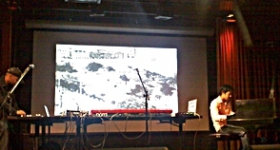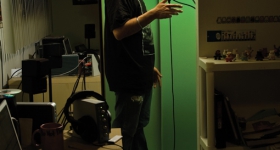Ee — the San Francisco band, not the frontman for the Eels, or the drug, or the exclamation — has more heads than it knows what to do with. The current lineup, having come together to back guitarist Tobin Mori when his first group, Korea Girl, imploded, meets at a point in the middle of all their influences. That worked fine for Ee’s recent Asian Man Records release, For 100 We Try Harder, but now that the group has toured, tightened up, recorded, played CMJ, and toured some more, they’re in a strange new environment.
“It’s not like we’re intentionally trying to reinvent,” explains bassist Che Chou, sitting in the apartment he shares with Mori in San Francisco’s Inner Sunset district. “I think we’ve just had these songs on the album for so long. When we first started, we didn’t have any expectations about anything. It was just like, ‘OK, Tobin’s old band fell apart so we’re going to play his songs.’” But Chou’s expressive, often bouncy bass, Peter Nguyen’s propulsive drumming (he also plays in the abrasive Total Shutdown), and the Neil Young-meets-Steve Malkmus lead guitar of Sooyoung Park (of Seam) made the poppy tracks from Ee’s first disc, Ramadan, sound like a whole different animal. (Park is now on a one-year hiatus.)
“We just started doing the stuff you hear on the new one,” continues Chou. “We didn’t know what we wanted to be. Now we have this album out, and it’s like, what do we do? Do we continue doing that? I feel like we set a precedent for ourselves, and now we have to either break it or continue. I mean, it’s obviously not going to be so black and white. But we have to figure out what makes us happy.”
“Happy” is not an adjective to describe For 100 We Try Harder. It’s a moody, multi-layered collection of elegant, largely wordless post-rock, studded with electronic glitches, banjo, piano, drone and dynamics. Mori’s melancholy musings bring the sound close to the brink of emo, but the complexity of the songs pulls them back from that predictable, navel-gazing abyss. The lyrics are thought-provoking, though. The disc’s first vocal track, “Beijing,” loads its title with a double meaning: desiring to constantly change and move (to China, for instance) while simultaneously suggesting a resistance toward a blanding, or “beiging,” of oneself. See Pavement’s intentional mangling of “Career” and “Korea” on “Cut Your Hair” for further reference.
The theme of constant motion is a consistent one for Ee. The liner notes to For 100 thank “the passersby who support us,” and the track “Thomas Sleeps Beneath an Old El Paso Tree,” beseeches the listener to “be passersby.” Mori explains that the notion is based on a passage from the biblical Gospel of Thomas, an apocryphal tome discovered in Egypt in 1945. “Its version of what Jesus says would be considered blasphemous by most churches. There’s a line in there about ‘passerby.’ Like, that’s what you should be in life: a passerby. It’s good to move. It’s good to travel and meet people, and not to be stagnant. That’s sort of how life is, we’re kind of just passing by. And going on tour really symbolizes that whole idea, meeting people momentarily.”
And getting a new perspective, too. Outside of San Francisco, the band’s audience is “mostly white kids,” says Chou. And perhaps there’s a way to honor that demographic when the band gets around to recording again. This last record’s title is the motto of 99 Ranch, a West Coast Asian supermarket chain. “It’s such an Asian thing to say,” says Chou, “Kind of like an Asian stereotype, like, we’re good at math. We get good grades.”
“Striving hard,” says Mori. “99 percent isn’t good enough.”
When I offer that there’s a liquor store in Oakland called Two Star, Mori cites a restaurant named OK Chinese Food.
“There’s a restaurant in Mountain View called Hong Kee,” adds Chou. “Maybe that’s what we’ll name our next record. Hong Kee Tonk.”









Comments